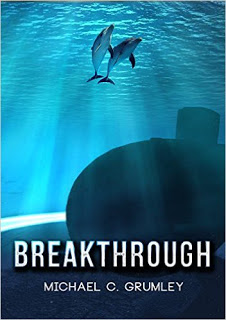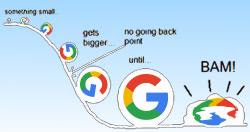
I have been looking for a long time for this kind of service, mainly because I wanted to monitor and persist stuff for my blog.
Firebase is all of that and more and, with a free plan of 1GB, it's pretty awesome. However, as it is a no SQL database and as it can be accessed via Javascript, it may be a bit difficult to get it at first. In this post I will be talking about how to use Firebase as a traditional database using their Javascript library.
So, first off go to the main website and signup with Google. Once you do, you get a page with a 5 minute tutorial, quickstarts, examples, API docs... but you want the ultra-quick start! Copy pasted working code! So click on the
Manage App button.
Take note of the URL where you are redirected. It is the one used for all data usage as well. Ok, quick test code:
var testRef = new Firebase('https://*******.firebaseio.com/test');
testRef.push({
val1: "any object you like",
val2: 1,
val3: "as long as it is not undefined or some complex type like a Date object",
val4: "think of it as JSON"
});
What this does is take that object there and save it in your database, in the "test" container. Let's say it's like a table. You can also save objects directly in the root, but I don't recommend it, as the path of the object is the only one telling you what type of object it is.
Now, in order to read inserted objects, you use events. It's a sort of reactive way of doing things that might be a little unfamiliar. For example, when you run the following piece of code, you will get after you connect all the objects you ever inserted into "test".
var testRef = new Firebase('https://*******.firebaseio.com/test');
testRef.on('child_added', function(snapshot) {
var obj = snapshot.val();
handle(obj); //do what you want with the object
});Note that you can use either
child_added or value, as the retrieve event. While 'child_added' is fired on each retrieved object, 'value' returns one snapshot containing all data items, then proceeds to fire on each added item with full snapshots.
Beware!, that means if you have a million items and you do a value query, you get all of them (or at least attempt to, I think there are limits), then on the next added item you get a million and one. If you use .limitToLast(50), for example, you will get the last 50 items, then when a new one is added, you get another 50 item snapshot. In my mind, 'value' is to be used with .once(), while 'child_added' with .on(). More details in my
Queries postJust by using that, you have created a way to insert and read values from the database. Of course, you don't want to leave your database unprotected. Anyone could read or change your data this way. You need some sort of authentication. For that go to the left and click on
Login & Auth, then you go to
Email & Password and you configure what are the users to log in to your application. Notice that every user has a UID defined. Here is the code to use to authenticate:
var testRef = new Firebase('https://*******.firebaseio.com/test');
testRef.authWithPassword({
email : "some@email.com",
password : "password"
}, function(error, authData) {
if (error) {
console.log("Login Failed!", error);
} else {
console.log("Authenticated successfully with payload:", authData);
}
});There is an extra step you want to take, secure your database so that it can only be accessed by logged users and for that you have to go to
Security & Rules. A very simple structure to use is this:
{
"rules": {
"test": {
".read": false,
".write": false,
"$uid": {
// grants write access to the owner of this user account whose uid must exactly match the key ($uid)
".write": "auth !== null && auth.uid === $uid",
// grants read access to any user who is logged in with an email and password
".read": "auth !== null && auth.provider === 'password'"
}
}
}
}This means that:
- It is forbidden to write to test directly, or to read from it
- It is allowed to write to test/uid (remember the user UID when you created the email/password pair) only by the user with the same uid
- It is allowed to read from test/uid, as long as you are authenticated in any way
Gotcha! This rule list allows you to read and write whatever you want on the root itself. Anyone could just waltz on your URL and fill your database with crap, just not in the "test" path. More than that, they can just listen to the root and get EVERYTHING that you write in. So the correct rule set is this:
{
"rules": {
".read": false,
".write": false,
"test": {
".read": false,
".write": false,
"$uid": {
// grants write access to the owner of this user account whose uid must exactly match the key ($uid)
".write": "auth !== null && auth.uid === $uid",
// grants read access to any user who is logged in with an email and password
".read": "auth !== null && auth.provider === 'password'"
}
}
}
}In this particular case, in order to get to the path /test/$uid you can use the
.child() function, like this:
testRef.child(authData.uid).push(...), where authData is the object you retrieve from the authentication method and that contains your logged user's UID.
The rule system is easy to understand: use ".read"/".write" and a Javascript expression to allow or deny that operation, then add children paths and do the same. There are a lot more things you could learn about the way to authenticate: one can authenticate with Google, Twitter, Facebook, or even with custom tokens. Read more at
Email & Password Authentication,
User Authentication and
User Based Security.
But because you want to do a dirty little hack and just
make it work, here is one way:
{
"rules": {
".read": false,
".write": false,
"test": {
".read": "auth.uid == 'MyReadUser'",
".write": "auth.uid == 'MyWriteUser'"
}
}
}This tells Firebase that no one is allowed to read/write except in /test and only if their UID is MyReadUser, MyWriteUser, respectively. In order to authenticate for this, we use this piece of code:
testRef.authWithCustomToken(token,success,error);
The handlers for success and error do the rest. In order to create the token, you need to do some cryptography, but nevermind that, there is an
online JsFiddle where you can do just that without any thought. First you need a secret, for which you go into your Firebase console and click on
Secrets. Click on "Show" and copy paste that secret into the JsFiddle "secret" textbox. Then enter MyReadUser/MyWriteUser in the "uid" textbox and create the token. You can then authenticate into Firebase using that ugly string that it spews out at you.
Done, now you only need to use the code. Here is an example:
var testRef = new Firebase('https://*****.firebaseio.com/test');
testRef.authWithCustomToken(token, function(err,authData) {
if (err) alert(err);
myDataRef.on('child_added', function(snapshot) {
var message = snapshot.val();
handle(message);
});
});
where token is the generated token and handle is a function that will run with each of the objects in the database.
In my case, I needed a way to write messages on the blog for users to read. I left read access on for everyone (true) and used the token idea from above to restrict writing. My html page that I run locally uses the authentication to write the messages.
There you have it. In
the next post I will examine how you can query the database for specific objects.
 The second book of The Expanse is much better written than the first, however the story is a little weaker. There are more of the details one would already be familiar with from the TV show, the character of Chrisjen Avasarala is introduced and chapters are written from the perspective of many more characters than just Miller and Holden. That means there are many more chances to completely dislike a chapter if you hate the character. For me, that character was Prax, someone who would endanger everybody and himself with random emotional outbursts. Perhaps he was put there just to offset the slightly similar behavior of Holden, who now looks like the paragon of professionalism in comparison.
The second book of The Expanse is much better written than the first, however the story is a little weaker. There are more of the details one would already be familiar with from the TV show, the character of Chrisjen Avasarala is introduced and chapters are written from the perspective of many more characters than just Miller and Holden. That means there are many more chances to completely dislike a chapter if you hate the character. For me, that character was Prax, someone who would endanger everybody and himself with random emotional outbursts. Perhaps he was put there just to offset the slightly similar behavior of Holden, who now looks like the paragon of professionalism in comparison.











